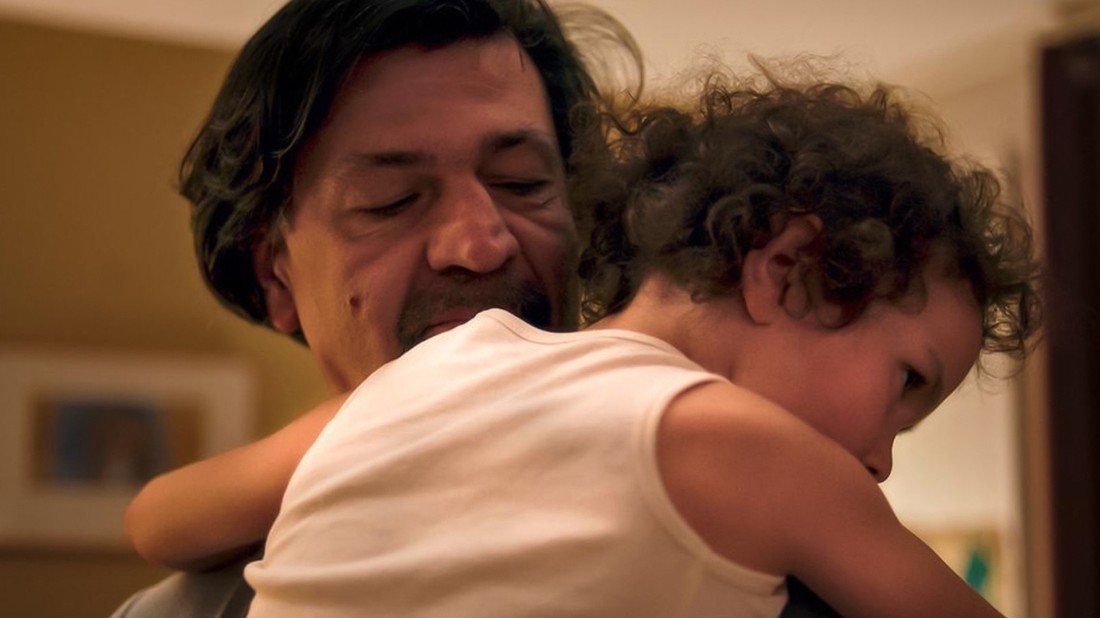In Marie Amachoukeli’s Àma Gloria there’s a remarkable performance by a child actor, Louise Mauroy-Panzani. So key is her contribution that It’s fair to say the director couldn’t have delivered the film she had planned without her,.
Mauroy-Panzani plays six-year-old Cléo, who lives in Paris with her widowed father (Arnaud Rebotini, pictured below with Mauroy-Panzani) in the care of Gloria, who, like the actress playing her, Ilça Moreno, is a nanny from the Cape Verde islands. And Cléo, very like the director herself, is short-sighted and already wears glasses. But Amachoukeli turns this into a distinctive way of shooting the film, not just a character detail. Cléo’s happy life is upended when Gloria has to return home for her mother’s funeral and decides she must make the journey a farewell one. It’s slowly revealed that she has a daughter, Nanda (Abnara Gomes Varela), at home who is heavily pregnant, as well as a young son, César (Fredy Gomes Tavares). A project she is trying to get off the ground, a tourist hotel, also needs her there to reboot it. Cléo’s father is persuaded to let her travel to stay with Gloria for one last summer.
Cléo’s happy life is upended when Gloria has to return home for her mother’s funeral and decides she must make the journey a farewell one. It’s slowly revealed that she has a daughter, Nanda (Abnara Gomes Varela), at home who is heavily pregnant, as well as a young son, César (Fredy Gomes Tavares). A project she is trying to get off the ground, a tourist hotel, also needs her there to reboot it. Cléo’s father is persuaded to let her travel to stay with Gloria for one last summer.
On the island, Cléo is confronted with an overlooked reality of Gloria’s life: her son, César, hardly knows her as she left for France to make money for the family when he was a baby and her late mother Salomé stepped in to care for the children. As Cléo herself notes, on the other hand, she has never known a world without Gloria, who has been with her since her memories began; she’s in them all. Predictably, César resents Cléo and has harsh things to say about Gloria, whose money he steals. Then when Nanda’s baby is born and Gloria become a de facto nanny to him, Cléo learns what it means not to be the centre of attention.
It’s a film that works by a slow but steady accumulation of sounds and visual effects. Its main visual tool is the close-up, typically of Cléo’s watchful face, her big brown eyes alert, but it also homes in on Cléo and Gloria’s cuddles and embraces, accompanied by a hypersensitive attention to sounds – breathing, sighing, laughing, crying. And lots of giggles from Cléo. It’s as if we have become Cléo with her limited visual range, focusing primarily on what is nearest in her field of vision, but being keenly aware of all the ambient sounds around her.
When she arrives on the island, this sound-world is amplified even further into a symphony of whooshes and splashes, as she takes to the water and learns to swim. The camera launches into a mad choreography in these sequences, echoing Cléo’s moves. From the opening credits onwards, Amachoukeli also uses blurrily animated scenes in pastel colours – some seascapes, others memories from Cleo’s point of view: of her small white hand in Gloria’s black one; of people in the distance comforting her father at what we assume was her mother’s funeral; of learning to walk and being scooped up by comforting black arms when she falls.
The shrinking of the world down to the scale of Cléo’s understanding serves another purpose, though: as a way of suggesting the inevitable self-centredness of the dependent child, furious and anxious at being passed over for a younger one. In this setup lie the seeds of a potential tragedy – which Amachoukeli sensibly ignores. Instead she offers a gentle but honest study of the strength of the bond between child and carer, as Cléo and Gloria establish how to salvage their close relationship when they are thousands of miles apart.
The two leads are, by necessity, fledgling actors, but it never shows. They seem wholly natural. Moreno is a strong, wise presence, whereas Mauroy-Panzani beguilingly takes us into her consciousness, her face registering each flicker of emotion, good and bad. She is driven by the most gleeful vitality playing football with the older boys, who come to accept her; in distress, her little face screws up as the tears flood down. It never feels unearned. Her performance ranks with Ana Torrent's in Spirit of the Beehive, Jean-Pierre Léaud's in The 400 Blows and Quvenzhane Wallis's in Beasts of the Spourhtern Wild in its ability to carry the film.
Amachoukeli could have made her screenplay take on more ballast or depict its hard-scrabble, fatherless lives with more grit. But its delicacy is its unique selling point: the viewer is there to share its characters’ emotional lives, not to tut at their economic exploitation. Gloria may be part of a wider cultural story, but it’s not one the film is focused on. Ultimately, the proof of her strength, her best ambassador, is little Cléo.















Add comment